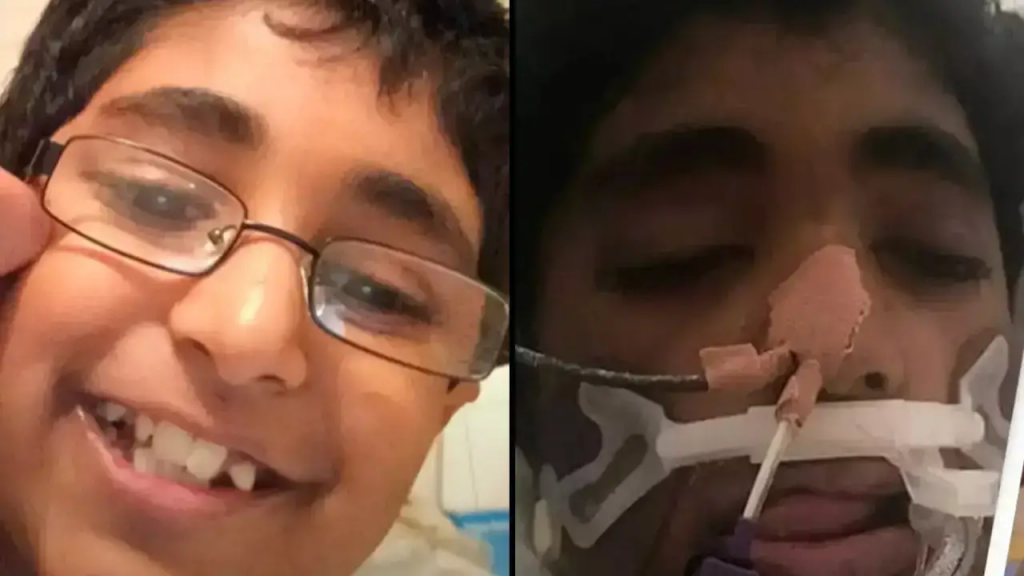A seemingly harmless prank at a school in London turned into a heartbreaking tragedy when a 13-year-old boy lost his life after a classmate threw a piece of cheese at him. What initially appeared to be a playful act led to devastating consequences, leaving a family shattered and raising serious concerns about allergy awareness and medical preparedness.
The Incident That Shocked a Community
On June 28, 2017, Karanbir Cheema, a bright and beloved student, was attending school when the incident occurred. A classmate, unaware of the potential danger, tossed a piece of cheese that landed on Karanbir’s neck. While the act may have seemed inconsequential to those around him, it triggered a severe allergic reaction almost immediately.

Karanbir, who was known to suffer from extreme allergies to dairy and other foods, began experiencing symptoms of anaphylaxis—a life-threatening allergic reaction. Teachers and staff acted swiftly to administer his EpiPen, but it later emerged that the device had expired nearly a year earlier. The outdated dose of adrenaline was insufficient to halt the progression of his reaction, and his condition rapidly worsened. Despite being rushed to Great Ormond Street Hospital, Karanbir succumbed to cardiac arrest just days later, leaving his family and community in utter shock.
A Family’s Unimaginable Loss
For Karanbir’s mother, Rina Cheema, the days following the incident were a whirlwind of pain and heartbreak. During an emotional interview, she recounted the agonizing decision to turn off her son’s life support. “We didn’t want to switch it off—it wasn’t fair on his little body to go through this,” she shared. Fighting through tears, she recalled his final moments, saying, “He smiled when the machine was turned off… It was like he was at peace.”
The tragedy left Karanbir’s family grappling with questions of what could have been done differently. The realization that his only available EpiPen was expired added a layer of guilt and regret. Could an up-to-date dose of medication have saved his life? These questions continue to haunt his loved ones and the broader community.
The Role of the Classmate
The boy responsible for throwing the cheese claimed he had no intention of harming Karanbir, insisting he was simply “playing around.” The coroner in the case, Mary Hassell, described the act as “childish and thoughtless” rather than malicious. While the boy’s actions were unintentional, they nonetheless served as a sobering reminder of the critical importance of understanding and respecting medical conditions like severe allergies.
Karanbir’s case sparked outrage and debate among the public. Many were quick to criticize the school’s lack of awareness and inadequate healthcare measures. “Ignorance doesn’t equal innocence,” one commenter wrote. “Allergies are no joke—schools need to take this seriously.” Another lamented, “This could have been avoided with better education and preparedness.”
A Rare and Tragic Case
Allergic reactions of such severity are exceptionally rare, particularly when triggered by skin contact rather than ingestion. During the 2019 inquest into Karanbir’s death, pediatric allergy consultant Dr. Adam Fox highlighted the unprecedented nature of the case. “If it was skin contact alone that caused, in this case, fatal anaphylaxis, I believe that to be unprecedented,” he explained.
Dr. Fox’s testimony underscored just how unique and devastating Karanbir’s reaction was. His comments served as a wake-up call for schools, parents, and medical professionals alike to reevaluate their protocols and better prepare for the unpredictable nature of severe allergies.
Lessons in Awareness and Preparedness
The tragedy brought to light critical gaps in allergy education and emergency response. The coroner emphasized a “missed opportunity” by the school to educate staff and students about the severity of Karanbir’s condition. Inadequate healthcare provisions and the lack of a current EpiPen on hand were cited as contributing factors to the fatal outcome.
In the aftermath of Karanbir’s passing, schools across the country faced mounting pressure to improve allergy awareness and emergency preparedness. From ensuring that staff are trained to recognize the signs of anaphylaxis to mandating that medications like EpiPens are checked regularly for expiration, Karanbir’s story serves as a painful but vital reminder of what’s at stake.
A Call for Greater Compassion
Karanbir Cheema’s untimely death has left an indelible mark on all who hear his story. For his grieving family, the loss is immeasurable. But amidst their sorrow, they hope that sharing Karanbir’s experience can spark change and prevent similar tragedies from occurring in the future.
As society becomes increasingly aware of the dangers posed by severe allergies, stories like Karanbir’s underscore the importance of compassion and understanding. Whether it’s educating students about the seriousness of these conditions or ensuring schools are equipped with up-to-date medical supplies, small actions can save lives.
Karanbir’s memory lives on as a beacon of the importance of vigilance, empathy, and action. His story challenges all of us to take allergies seriously and to advocate for a safer, more informed world.
